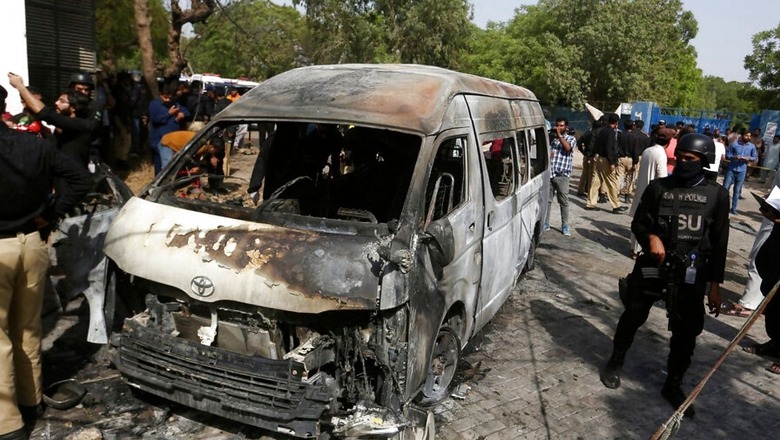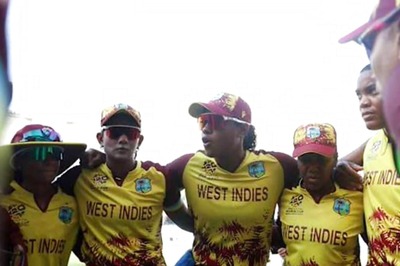
views
The Baluchistan Liberation Army has claimed responsibility for the attack carried by a woman suicide bomber inside the University of Karachi campus in southern Pakistan on Tuesday that killed three Chinese nationals and their Pakistani driver.
The Chinese fatalities included the director of the Chinese-built Confucius Institute, which offers Chinese language graduate classes, and two teachers. The Chinese Embassy in Pakistan confirmed the deaths of three Chinese teachers and one teacher injured in the “terror” attack and urged the Pakistan government “to make every effort to treat the wounded, conduct a thorough investigation of the attack, and severely punish the perpetrator.”
The Pakistan Foreign Ministry in a statement condemned the attack and the killing of Chinese in Karachi. “The cowardly incident is a direct attack on the Pakistan-China friendship and ongoing cooperation,” it said and added authorities were investigating the incident to apprehend the culprits and bring them to justice.
The militant group based in Balochistan province has targeted Chinese nationals in attacks in the past.
Here’s Everything That We Know So Far
- The mineral-rich region of Baluchistan borders Afghanistan to the north, Iran to the west and has a long coastline on the Arabian Sea. It has Pakistan’s largest natural gas field, is believed to have many more undiscovered reserves and precious metals including gold. Separatists have called out the unfair exploitation of the region’s resources leading to decades of insurgency in the province.
- The Baluchistan Liberation Army, which has also called for independence from Islamabad, has mainly targeted Pakistani security forces, but in recent years they have also focused on attacks against Chinese interests, due to Beijing’s increasing economic footprint in the region.
- Thousands of Chinese workers are living and working in Pakistan, with most of them involved in Beijing’s multi-billion-dollar One Belt One Road Project. The Gwadar Port in Baluchistan province’s linking with China’s Xinjiang province is the main feature of the China-Pakistan Economic Corridor due to its strategic location near the Strait of Hormuz – a crucial oil shipping route in the Arabian Sea. A Chinese company also operates a major gold and copper mine in Balochistan.
- The Baluchistan Liberation Army (BLA) stated that it attacks Chinese nationals because Beijing has ignored its warnings on not to enter deals and agreements regrading the region before the province had been “liberated”.
- The group’s statement following Tuesday’s attack identified the bomber as Shari Baluch or Bramsh, saying she was the group’s first female bomber. The attack marks “a new chapter in the history of Baluch resistance,” the statement said.
- The BLA has also claimed attacks in Karachi including the Pakistan Stock Exchange Building in 2020 and the Chinese consulate in 2018.
- The group demands that all Pakistani security forces withdraw from Balochistan and has suggested negotiations in the presence of an “international guarantor”.
- The militant group has claimed a number of major attacks in recent months, including a simultaneous storming of two paramilitary bases in Balochistan earlier this year. Most of the attack by the group take place in Balochistan or in Karachi.
- The group was led by Balach Marri, scion of an influential Baloch family. Security officials have said Marri was killed in Afghanistan in 2007, where he had established a base and hideout. After initial setbacks due to Marri’s death, the militant group has accelerated its attacks, particularly in the last year.
- The Baluchistan Liberation Army says it is currently led by a man named Bashir Zeb Baloch. While little is known about the group’s commander-in-chief, the organisation said that its “Fidayees” (guerrillas) are made up of young, educated Baloch disillusioned by hardship and being sidelined from economic development.
- The Pakistan Taliban also known as the Tehreek-e-Taliban Pakistan had claimed responsibility for an attack on a bus that killed nine Chinese nationals and four Pakistan nationals in Khyber Pukhtunkhwa province last July. The Pakistani Taliban are a separate group from the Afghan Taliban, their allies who have seized power in neighboring Afghanistan.
(With inputs from AP, Reuters)
Read all the Latest News here
















Comments
0 comment